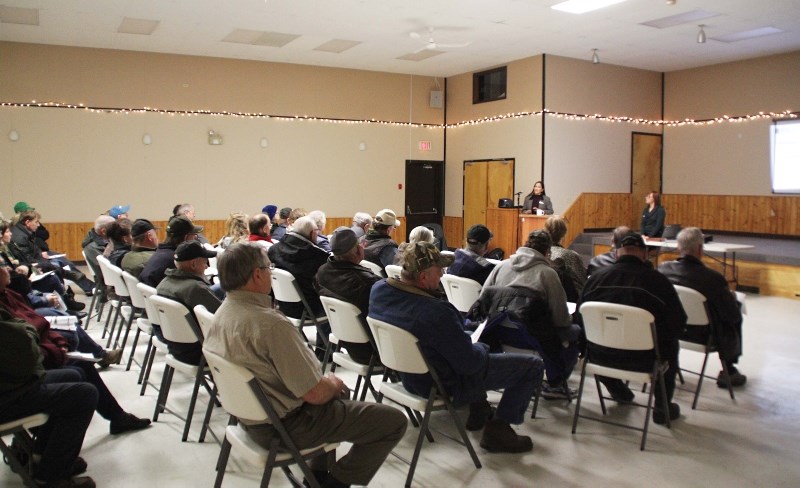The Alberta Utilities Commission held a preliminary information session Wednesday open to the public but particularly for residents affected by ATCO's proposed transmission development from the Bonnyville 700S substation to the Bourque 970S substation.
The session, at Willow Prairie Hall in La Corey, aimed to explain the application and hearing processes, and inform residents on how to participate and be involved in the entire process.
Representatives for the AUC said the commission typically does not come out to the application location and hold an information session prior to the completion of an application. However, the large outpouring of emotion and interest regarding this particular project prompted the meeting with residents.
Though some of the over 75 residents on hand were opposed to having transmission towers and lines running through or near their property or livestock, others were simply upset over ATCO's apparent disregard for the process set out by the commission.
Despite not having completed the application for the project as of Dec. 10, residents in the area have accused ATCO representatives and contractors of surveying the land on and around private property and acting as though the transmission development is a “done deal.”
“It just flies in the face of common courtesy,” said one resident. “It's not that I'm against the project. I would just like ACTO to follow the rules and have some respect for the rural folks out here. Once you lose our trust, it's hard to get it back.”
Others have complained that land agents representing ATCO have been pitting neighbours against each other and making veiled threats concerning compensation or a lack there of.
One resident said he was called by ATCO out of the blue just a day after signing up to speak about his concerns at the hearing. He said the company was trying to convince him to sign a land agreement and to convince his father-in-law to do the same.
Another call came in just a day before the preliminary information session, again trying to convince him and his family to sign on.
“It's just really frustrating the way we are being treated,” said Clay Braithwaite, who lives and owns land along ATCO's alternative route for the transmission line. “I had one land man come out and ask me how I felt about the project. I told him some of the things I was concerned about and he said to me, ‘So, I'll just mark you down as against the project then?'”
Braithwaite continued, “He didn't care what I was concerned about. I'm not even really against the actual project. It just feels like they don't really care about us or what we have to say.”
Although Braithwaite was not able to explain his concerns to the land agent, by attending the session, he is now more comfortable taking part in the entire process, including voicing his concerns as an intervener at the hearing, which would take place once the application is complete.
“I was a little unsure of this at first. But once I cooled down and listened to (representatives from the AUC) I realized they've here to help and there are ways to go about being heard,” said Braithwaite.
He, like many of the residents concerned with the placement and potential risks of the transmission development, does not have a lot of time to deal with the “mountains of paperwork” or “the money to hire a lawyer.”
However, Indra Maharaj, legal counsel for the AUC, presenting at the session, explained some of the routes residents could take to alleviate some of those time constraints and financial concerns.
She said residents can apply for local intervener funding, which can cover some of the costs of participating in the hearing process. She also mentioned certain legal counsel that will take on cases like these for little or no costs to the resident.
Though she cautioned, “Always have the conversation about costs right away. Don't put it off.”
One resident, who found a lawyer that specializes in dealing with ATCO hearings, said he hopes residents with similar concerns can come together to make an even stronger case.
There were residents attending the session who outright questioned the need of a new transmission development in the area.
One pointed out the possibility that this particular project is just a small part of a bigger plan to eventually generate surplus power and sell it to the United States.
“If it's ratepayers on the hook for this project, is it ratepayers on the hook for the profits,” he asked facetiously.
Maharaj did her best to answer all the questions she could, but pointed out the session was for information about the process, not about specifics regarding the project.
Prior to reaching the hearing process, which would take place in the Bonnyville area, likely sometime in the new year, the application process needs to be completed.
Once ATCO's application is completed, the AUC will send out a notice of application through local media outlets. At that point, anyone not registered as an intervener should do so if they want to participate in the hearing.
There will then be a notice of hearing sent out, followed by the filing of evidence, the actual hearing itself and finally a decision regarding the project.
The commission, after looking at evidence from both sides, will determine if the project is in the best interest of Albertans in terms of social, economic and environmental benefits and costs and then decide to approve, approve with conditions or deny the application.



